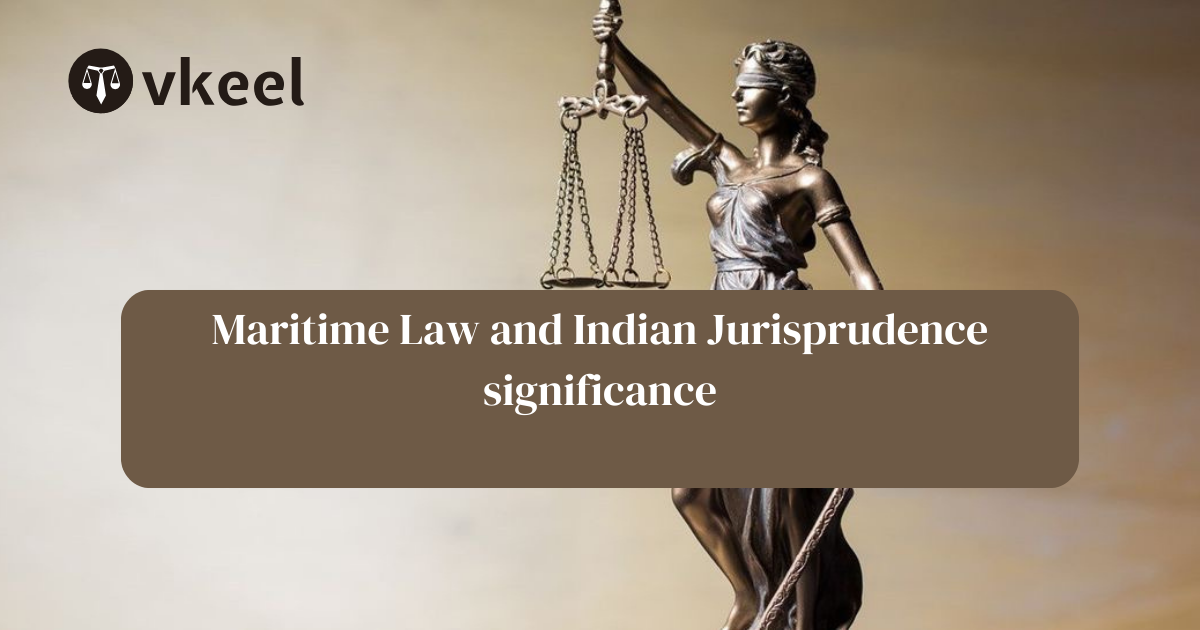Maritime Law and Indian Jurisprudence significance
By Himanshu Kumar
Table of Contents
Introduction
Maritime law, also known as admiralty law, is a distinct body of law that governs maritime activities. It deals with various issues such as shipping, navigation, waters, insurance, the rights of seamen, and the transportation of goods and passengers by sea. Maritime law is one of the oldest branches of law, with its origins tracing back to ancient civilizations. India, with its extensive coastline, has a long history of maritime trade, which has necessitated a robust legal framework to govern maritime activities.
Indian jurisprudence in the field of maritime law has evolved significantly over the years, influenced by both international conventions and domestic legislation. This article explores the development of maritime law in India, its legal framework, significant case laws, and recent amendments that have shaped the landscape of maritime jurisprudence in the country.
Historical Background
The history of maritime law in India dates back to the ancient period when Indian maritime trade was flourishing. The Arthashastra, an ancient Indian treatise on statecraft, mentions regulations concerning ships and maritime activities. However, modern maritime law in India was primarily shaped during the British colonial period.
The first significant legislative framework in maritime law was the Indian Ports Act of 1908, which provided regulations for the administration of ports. Following this, the Merchant Shipping Act of 1923 was introduced, which laid down comprehensive provisions concerning the registration of ships, the safety of ships, and the welfare of seafarers.
Post-independence, India retained much of the colonial maritime law, but with several amendments to align with the changing needs of the maritime industry and international conventions.
Legal Framework
The legal framework governing maritime law in India comprises several statutes, regulations, and international conventions. The key legislation includes:
- The Merchant Shipping Act, 1958: This is the principal legislation governing shipping in India. It consolidates the law relating to merchant shipping and deals with various aspects such as the registration of Indian ships, safety of vessels, prevention of pollution, and employment conditions of seafarers. The Act has been amended multiple times to keep pace with international maritime standards and practices.
- The Indian Ports Act, 1908: This Act provides for the regulation and control of major and minor ports in India. It outlines the responsibilities of port authorities and provides for the management and safety of port facilities.
- The Admiralty (Jurisdiction and Settlement of Maritime Claims) Act, 2017: This Act consolidates the laws relating to admiralty jurisdiction and regulates maritime claims. It replaced several outdated colonial laws and expanded the scope of maritime claims, including issues related to ownership disputes, mortgage of ships, and employment disputes of seafarers.
- The Marine Insurance Act, 1963: This Act governs marine insurance in India. It defines the rights and obligations of parties in a marine insurance contract and provides remedies in case of disputes.
- The Carriage of Goods by Sea Act, 1925: This Act governs the rights and liabilities of parties involved in the carriage of goods by sea. It is based on the Hague Rules, an international convention that standardizes certain aspects of bills of lading.
- The Major Port Authorities Act, 2021: This recent legislation aims to modernize the governance of major ports in India. It provides more autonomy to port authorities and simplifies the regulatory framework to enhance the efficiency of port operations.
International Conventions and Indian Jurisprudence
India is a signatory to several international conventions related to maritime law, which have significantly influenced its domestic legal framework. Some of the key conventions include:
- United Nations Convention on the Law of the Sea (UNCLOS), 1982: UNCLOS is the primary international treaty that defines the rights and responsibilities of nations concerning the use of the world’s oceans. It covers various aspects such as territorial waters, exclusive economic zones (EEZs), and the continental shelf. India ratified UNCLOS in 1995, and its provisions are reflected in domestic laws such as the Territorial Waters, Continental Shelf, Exclusive Economic Zone, and Other Maritime Zones Act, 1976.
- International Convention for the Safety of Life at Sea (SOLAS), 1974: SOLAS sets minimum safety standards for the construction, equipment, and operation of ships. India, as a member of the International Maritime Organization (IMO), has incorporated the provisions of SOLAS into its domestic legislation, primarily through the Merchant Shipping Act, 1958.
- International Convention on Civil Liability for Oil Pollution Damage (CLC), 1969: This convention establishes the liability of shipowners for oil pollution damage and provides compensation to victims of such damage. India is a party to this convention, and its provisions are implemented through the Merchant Shipping Act, 1958.
- International Convention on Maritime Liens and Mortgages, 1993: This convention establishes a uniform legal framework for maritime liens and mortgages. India has incorporated its provisions into the Admiralty (Jurisdiction and Settlement of Maritime Claims) Act, 2017.
Significant Case Laws
- MV Elisabeth v. Harwan Investment & Trading Pvt. Ltd. (1993): This landmark judgment by the Supreme Court of India marked a turning point in Indian admiralty law. The Court held that Indian courts have jurisdiction over foreign ships involved in disputes arising within Indian territorial waters, even in the absence of specific statutory provisions. The judgment emphasized the need for India to have a comprehensive admiralty law, leading to the eventual enactment of the Admiralty (Jurisdiction and Settlement of Maritime Claims) Act, 2017.
- Rashmi Cement Ltd. v. MV Cape Climber (2010): This case dealt with the arrest of a ship in India for a maritime claim arising out of a charter party agreement. The Bombay High Court held that the arrest of a ship for security in a maritime claim is a well-recognized remedy under Indian law, reflecting the principles of international maritime law.
- Gujarat Maritime Board v. Essar Oil Ltd. (2004): In this case, the Supreme Court dealt with the issue of port dues and charges. The Court held that the Gujarat Maritime Board had the authority to levy charges on vessels using its facilities, even if the vessel was merely passing through without engaging in any commercial activity. The judgment reinforced the regulatory powers of port authorities under the Indian Ports Act, 1908.
- Adani Enterprises Ltd. v. Union of India (2016): This case involved a dispute over the dredging of the Mundra Port, operated by the Adani Group. The Supreme Court ruled in favor of Adani Enterprises, upholding the validity of the dredging contract and emphasizing the importance of commercial contracts in the maritime industry.
Recent Amendments and Developments
- The Admiralty (Jurisdiction and Settlement of Maritime Claims) Act, 2017: This Act replaced several outdated colonial laws such as the Admiralty Court Act, 1861, and the Colonial Courts of Admiralty Act, 1890. It expanded the scope of admiralty jurisdiction to include a wide range of maritime claims, including those related to the ownership of vessels, mortgage of vessels, and disputes involving seafarers. The Act also introduced provisions for the arrest of ships and the enforcement of maritime claims.
- The Major Port Authorities Act, 2021: This Act replaced the Major Port Trusts Act, 1963, and aims to modernize the governance of major ports in India. It provides more autonomy to port authorities by reducing the central government’s role in the management of ports. The Act also simplifies the process for tariff setting and dispute resolution, which is expected to enhance the efficiency of port operations.
- Amendments to the Merchant Shipping Act, 1958: The Merchant Shipping Act has undergone several amendments to align with international conventions and address emerging challenges in the maritime industry. For instance, the 2014 amendment introduced provisions related to the prevention of pollution from ships and the protection of the marine environment, in line with the International Convention for the Prevention of Pollution from Ships (MARPOL).
- The Coastal Regulation Zone (CRZ) Notification, 2019: Although not directly a maritime law, the CRZ Notification has significant implications for maritime activities, particularly in the context of coastal development and the protection of the marine environment. The 2019 notification relaxed certain restrictions on coastal development, which has implications for port development and other maritime infrastructure projects.
Challenges and Future Directions
While India has made significant strides in developing its maritime legal framework, several challenges remain. One of the primary challenges is the enforcement of maritime claims, particularly in cases involving foreign ships. The process of arresting a ship and securing a maritime claim can be time-consuming and expensive, which may deter claimants from pursuing their claims.
Another challenge is the need for greater harmonization between Indian maritime law and international conventions. While India is a signatory to several international conventions, there are gaps in the domestic implementation of these conventions. For instance, India has yet to ratify the Rotterdam Rules, which aim to modernize the legal framework for the carriage of goods by sea.
The future of maritime law in India will likely involve continued efforts to modernize the legal framework, enhance the efficiency of maritime dispute resolution, and strengthen the enforcement of maritime claims. Additionally, as India continues to expand its maritime infrastructure, there will be a need for greater regulation of environmental protection and sustainable development in the maritime sector.
Conclusion
Maritime law plays a vital role in India’s legal landscape, given the country’s strategic position along major international shipping routes and its extensive coastline. The evolution of Indian maritime jurisprudence has been shaped by a combination of historical influences, international conventions, and domestic legislation, resulting in a robust legal framework that governs a wide array of maritime activities. Significant judicial decisions have further refined this framework, ensuring that Indian maritime law remains responsive to the needs of the industry while aligning with global standards.
However, challenges such as the enforcement of maritime claims and the harmonization of domestic laws with international conventions continue to persist. As India continues to expand its maritime infrastructure and participate actively in global maritime trade, it will be essential to address these challenges through ongoing legal reforms and capacity-building efforts. By doing so, India can strengthen its maritime legal framework, ensuring the protection of its maritime interests while contributing to the stability and development of the global maritime community.
Disclaimer:
The information provided in the article is for general informational purposes only, and is not intended to constitute legal advice or to be relied upon as a substitute for legal advice. Furthermore, any information contained in the article is not guaranteed to be current, complete or accurate. If you require legal advice or representation, you should contact an attorney or law firm directly. We are not responsible for any damages resulting from any reliance on the content of this website.









